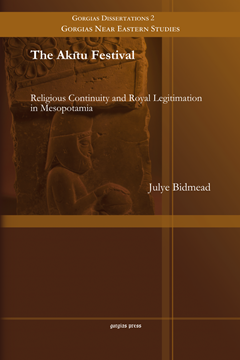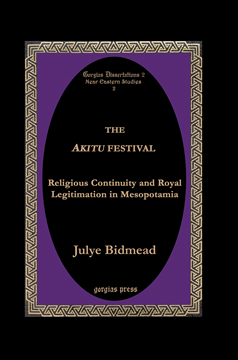Julye Bidmead
The Akītu Festival (paperback)
Religious Continuity and Royal Legitimation in Mesopotamia
Series: Gorgias Near Eastern Studies 2
ISBN: 978-1-4632-0265-1
The akītu festival is one of the oldest recorded religious festivals in the world, celebrated for several millennia throughout ancient Mesopotamia. Yet, the akītu was more than just a religious ceremony; it acted as a political device to ensure the supremacy of the king, the national god, and his capital city. Using tools of social anthropology and ritual analysis, this book presents a detailed reconstruction of the festival events and its attendant rituals to demonstrate how the festival became a propagandistic tool wielded by the monarchy and ruling classes. The akītu festival demonstrates the effectiveness of religion as a political tool.
$85.00 (USD) $51.00 (USD)
The Akītu Festival (hardback)
Religious Continuity and Royal Legitimation in Mesopotamia
Series: Gorgias Near Eastern Studies 2
ISBN: 1-59333-158-4
The akītu festival is one of the oldest recorded religious festivals in the world, celebrated for several millennia throughout ancient Mesopotamia. Yet, the akītu was more than just a religious ceremony; it acted as a political device to ensure the supremacy of the king, the national god, and his capital city. Using tools of social anthropology and ritual analysis, this book presents a detailed reconstruction of the festival events and its attendant rituals to demonstrate how the festival became a propagandistic tool wielded by the monarchy and ruling classes. The akītu festival demonstrates the effectiveness of religion as a political tool.
$124.00 (USD) $74.40 (USD)


